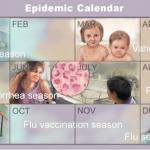Promising work just published in Nature Medicine especially offers hope to chronically ill patients battling drug-resistant infections while most compromised with weakened im
infectious disease
Last month, we reported on an earth-shattering documentary not-so-subtly titled Seattle Is Dying.
The headlines are rampant lately about “a mysterious and deadly fungal infection..spreading across the globe” that identifies multidrug-resistant yeast, Candida auris, as a “new fungal superbug.” And, as is common with such alarming heade
After developing a swollen eye and experiencing severe, escalating pain for three hours after visiting a relative’s gravesite, a woman in
The public sphere is inundated with malicious messages about those who are fearful of or resistant to vaccination. Low hanging fruit that includes name-calling to overtly aggressive, vicious attacks abound (e.g.
Another creepy hemorrhagic fever is in the news. This time, the victims are pigs, rather than humans.
It is once again flu season, and yes, you should get a flu vaccination. But why is flu so seasonal; for that matter, why did polio strike more in the summer and what about acute flaccid myelitis?
The homelessness crisis in several major cities across the United States is a national embarrassment. And the news keeps getting worse.
The flu has arrived in the U.S. for the 2018-2019 season. Kentucky just reported its first flu-related death.
Downtown Los Angeles has been hit by typhus, a disease that most people probably have never heard of. What is it, and how did it happen?












